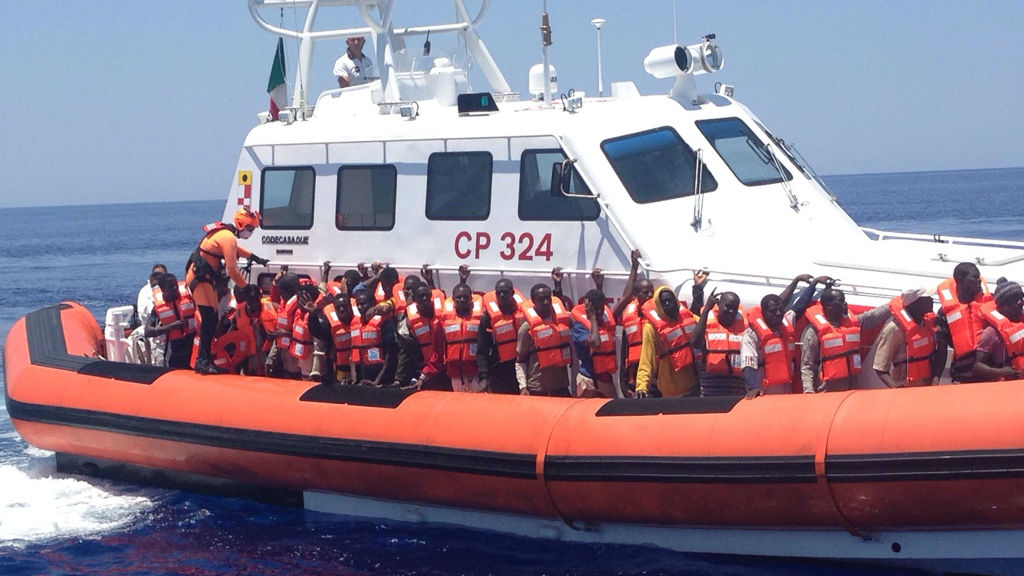Migrant SAR Training Goes Beyond SOLAS

An estimated 219,000 migrants crossing the Mediterranean in 2014 and 90,000 have crossing so far this year. A recent P&I club circular noted that a master that doesn’t do their duty under SOLAS Chapter V Regulation 33 can face up to two years’ imprisonment.
The regulation provides that absent “special circumstances,” a ship is bound to proceed with all speed to assist persons in distress. But while SOLAS is clear on a master’s responsibilities, some say it is out-of-date with regard to the scale of the problem.
“We are seeing harrowing scenes in the media of the often deadly journeys taken by migrants and their traffickers through the Mediterranean and South China Seas,” says Mike Pearsall, Product Manager at U.K.-based Marlins, a training firm that has just developed a course specifically for migrant rescue. “The SOLAS Convention was never designed to accommodate large-scale rescue operations of migrants, so seafarers are facing an unpredictable challenge that they are not currently prepared for.”
SOLAS was designed to help distressed persons at sea, however it was always assumed that the rescues would be at a small scale and there would probably be a number of vessels involved.
“SOLAS was written presuming those being rescued would have some degree of seamanship and would be able to partially help themselves, also that vessels needing assistance would be equipped with their own life saving apparatus,” says Pearsall.
“With what is happening in the news you will see that often the migrants and refugees do not have any seamanship experience and the craft they are in does not have any, or inadequate life-saving equipment. The reduction in crew size means that knowing what to do and when in doubt, who to take advice from or which manual to turn to is even more necessary in today’s merchant fleets.”
The new course, entitled “Humanitarian Response” builds on practical experience from private maritime security companies, vessel owners and managers, combined with important legal and humanitarian perspectives. The aim is to address a significant knowledge gap in the maritime industry; ensuring an effective and efficient response to crisis scenarios involving migrants and refugees, says Pearsall.
The U.K.-based charity Human Rights at Sea (HRAS) has been involved in the development of the course and will assist with its delivery. The course will, amongst other legal topics, make reference to Rules of Force and Deprivation of Liberty standards. HRAS, in co-ordination with the E.U.’s MARSAFENET group of maritime experts, has already issued robust guidance on deprivation of liberty for shipowners, masters, crew and private maritime security companies - available via a free-to-download, international publication.
“The training will address security measures as part of the course and has been written with the knowledge that traffickers and extremists could be amongst those rescued,” says Pearsall. “The course gives the ships advice on dealing with these potential issues and how to keep the ship and crew, as well as other rescued persons, safe.”
The course is a generic course and not region specific. It uses Mediterranean case studies as well as those from the Andaman Sea, Cuba and Australia.
A ship should expect to have rescued people on board for an undetermined and varied period of time. The master and owner will need to take into account any regional political issues which may prevent landing at the next safe port and otherwise extend the time migrants may spend onboard, as well as the issue of non-refoulement which is the return of persons to a place where they may be persecuted.
“Ships could be put at risk from security issues and health issues to name just a few,” says Pearsall. “The training covers how to deal with potential security, how to keep the crew safe during embarkation and transit of the rescued persons, health and safety provisions when dealing with the rescued persons as well as dealing with the aftermath of the rescue effort. This includes the crew’s welfare and the potential need for counselling.”
David Hammond, Founder of HRAS, says: “Whilst the rescue of migrants and trafficked people at sea seemingly represents an unwelcome additional burden to an overstretched shipping industry, the legal and moral obligations cannot be ignored. The issue is no longer an exception, but may well become a norm as the migrant flows continue north through Africa and from the Middle East.”
The products and services herein described in this press release are not endorsed by The Maritime Executive.
